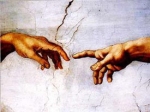Verse: Matt 17:12-13 “But I tell you that Elijah has already come, and they did not recognize him, but
did to him whatever they pleased. So also the Son of Man will certainly suffer at their hands." ESV
Matthew 11:9-17; Matthew 17:1-13
As they went away, Jesus began to speak to the crowds concerning John: "What did you go
out into the wilderness to see? A reed shaken by the wind? What then did you go out to see?
A man dressed in soft clothing? Behold, those who wear soft clothing are in kings' houses.
What then did you go out to see? A prophet? Yes, I tell you, and more than a prophet. This is
he of whom it is written, "'Behold, I send my messenger before your face, who will prepare
your way before you. Truly, I say to you, among those born of women there has arisen no one
greater than John the Baptist. Yet the one who is least in the kingdom of heaven is greater
than he. From the days of John the Baptist until now the kingdom of heaven has suffered
violence, and the violent take it by force. For all the Prophets and the Law prophesied until
John, and if you are willing to accept it, he is Elijah who is to come. He who has ears to hear,
let him hear.” ESV
He must increase, but I must decrease.
These words imply so much more than just a random man born from Mary’s cousin Elizabeth in her old
age. With John there came a righteous transfer of the Aaronic priesthood to that of Melchizedek (Psalm
110:1-4).
Matthew 3:11-15
"I baptize you with water for repentance, but he who is coming after me is mightier than I,
whose sandals I am not worthy to carry. He will baptize you with the Holy Spirit and with fire.
His winnowing fork is in his hand, and he will clear his threshing floor and gather his wheat
into the barn, but the chaff he will burn with unquenchable fire."
Then Jesus came from Galilee to the Jordan to John, to be baptized by him. John would have
prevented him, saying, "I need to be baptized by you, and do you come to me?" But Jesus
answered him, "Let it be so now, for thus it is fitting for us to fulfill all righteousness." Then he
consented. ESV
Luke 16:16
"The Law and the Prophets were until John; since then the good news of the kingdom of God is
preached, and everyone forces his way into it (Or everyone is forcefully urged into it.” ESV
Read pp. 51-52 Messiah in the Feasts of Israel by Sam Nadler
In a traditional Jewish Seder there is an empty place set at the table for Elijah. There is a cup of wine
filled for Elijah the prophet in anticipation of his arrival. Elijah’s cup is usually quite ornate as he is an
honored guest. At the very end of the Seder after the afikomen is found, a child is sent to the front door
to check and see if Elijah the prophet will arrive. The child returns from the door and the final statement
in the meal is: “Maybe next year in Jerusalem”. The anticipation for Elijah’s arrival comes from
Malachi 4:5-6
"Behold, I will send you Elijah the prophet before the great and awesome day of the Lord comes.
And he will turn the hearts of fathers to their children and the hearts of children to their fathers,
lest I come and strike the land with a decree of utter destruction." ESV
Passover is characterized as the feast that celebrates our freedom but for the Jews their Seder ends in a
lament. The “Elijah cup” sits alone and untouched until the completion of the meal and the wine is
carefully returned to the bottle. No joy is found in the announcement of the Messiah. So it is with
everyone who does not find the Messiah Jesus in the Passover.
The spirit and power of Elijah.
Zechariah was a priest serving his round of duty in the Temple. He was chosen by lot to enter the
Temple and burn incense. This duty was an honor given the priests once in a lifetime. While he was
alone in the Holy Place with the incense, he was visited by an angel of the Lord and given this prophecy:
Luke 1:13-17
The angel said to him, "Do not be afraid, Zechariah, for your prayer has been heard, and your
wife Elizabeth will bear you a son, and you shall call his name John. And you will have joy and
gladness, and many will rejoice at his birth, for he will be great before the Lord. And he must
not drink wine or strong drink, and he will be filled with the Holy Spirit, even from his mother's
womb. And he will turn many of the children of Israel to the Lord their God, and he will go
before him in the spirit and power of Elijah, to turn the hearts of the fathers to the children,
and the disobedient to the wisdom of the just, to make ready for the Lord a people prepared."
ESV
John was most likely the last of the Aaronic line of priests.
___________________________________________________________________________________
“Was John the Baptist the Last Aaronic High Priest?” (posted by Kyle Tucker On December 12, 2005):
Every Bible student knows that in the days of Christ’s ministry, the high priesthood fluctuated between
Annas and Caiaphas. At this late stage in the Aaronic order, the high priest was a Roman appointee. It is
doubtful that these political appointees who were in and out of office with every whim of the Romans
was truly God’s high priest.
If these men were not the true high priest from God’s perspective, who was? Was John the Baptist the
last high priest of the Aaronic order? Let’s look at the evidence.
1. John was a descendent of Aaron from both his mother and his father’s side. The Gospel of Luke
makes a special point of this fact. “There was in the days of Herod, the king of Judaea, a certain
priest named Zacharias, of the course of Abia: and his wife was of the daughters of Aaron, and
her name was Elisabeth.” (Luke 1:5) This odd little fact nestled in Luke’s gospel is trying to tell us
something.
2. John did not use wine. This is often conjectured that this was because John was a Nazarite.
However, the other qualifications for being a Nazarite (not cutting the hair and not being defiled
by a dead person) are never mentioned in the passages concerning John. The abstinence from
wine on the other hand was also a command of the high priest. “And the Lord spake unto Aaron,
saying, do not drink wine nor strong drink, thou, nor thy sons with thee, when ye go into the
tabernacle of the congregation, lest ye die: it shall be a statute forever throughout your
generations.” (Lev. 10:8,9)
3. One of John’s missions was to “prepare ye the way of the Lord.” (Mark 1:3) This could have
many different interpretations. Consider, though, that the preparation could be for the new
priesthood, the order of Melchizadek.
4. The prophecy of Malachi has three references in it to a messenger. The first instance is referring
to the state of the priesthood. “For the priest’s lips should keep knowledge, and they should
seek the law at his mouth: for he is the messenger of the LORD of hosts.” (Malachi. 2:7) The
second reference is to John and the “messenger of the covenant”, Jesus. “Behold, I will send my
messenger, and he shall prepare the way before me: and the Lord, whom ye seek, shall
suddenly come to his temple, even the messenger of the covenant” (Malachi. 3:1). It makes
sense that this word in all three instances refers to a priest instead of one, John, being the odd
man out.
5. If we have correctly assessed John’s role as the last high priest of the Aaronic order, John’s
father, Zacharias, would have also been a high priest. Perhaps this is why God chose Zacharias
by lot to perform the act of offering on the altar of incense. This duty was supposed to be
performed by the high priest. “And Aaron shall burn thereon sweet incense every morning:
when he dresseth the lamps, he shall burn incense upon it. And when Aaron lighteth the lamps
at even, he shall burn incense upon it, a perpetual incense before the LORD throughout your
generations.” (Exodus. 30:7,8) Furthermore, is it simply ironic or a clear Bible echo that Aaron’s
wife was also named Elisabeth. “And Aaron took him Elisheba [Hebrew form of Elisabeth],
daughter of Amminadab, sister of Naashon, to wife” (Ex. 6:23.)
6. It makes sense for the true high priest of God to baptize Jesus. The scene of Jesus’ baptism
would be a transition in priesthoods. “And thou shalt bring Aaron and his sons unto the door of
the tabernacle of the congregation, and wash them with water. And thou shalt put upon Aaron
the holy garments, and anoint him, and sanctify him; that he may minister unto me in the
priest’s office” (Exodus. 40:12,13).
7. If what we have conjectured is true, it puts an entirely new perspective on John’s statement “He
must increase, but I must decrease” (John 3:30.) His priesthood was decreasing while the
priesthood of the order of Melchizadek was increasing.
We wouldn’t be dogmatic on any of the preceding suggestions, but it is one of those ideas that make us
marvel at the endless intricacies of God’s word.
Have a great week!
Article printed from WCF | Thought for the Week: http://wcfoundation.org/tftw_blog
URL to article: http://wcfoundation.org/tftw_blog/2005/12/12/was-john-the-baptist-the-last-aaronic-
___________________________________________________________________________________
Jesus identified John the Baptist as the spirit of Elijah.
Matthew 11:7-15
On the Mount of Transfiguration, Moses (the law) and Elijah (the prophets) appeared with Jesus in the
company of Peter, James, and John. For some moments they talked together and an audible voice
identified Jesus. “This is my beloved Son, with whom I am well pleased; listen to him.” It is interesting to
note also that these two men, Moses and Elijah, did not die in the usual fashion. Moses walked up the
mountain and God Himself buried him, and Elijah was taken up in a whirlwind into heaven.
Indeed, all of the law (Torah) and the prophets (prophetic books in the Old Testament) testified of the
Messiah, Jesus. John, the rightful high priest according to the line of Aaron, transferred his ministry to
our Messiah. John released that new order of priesthood through the baptism in the Jordan River.
Matt 3:13-17
Then Jesus came from Galilee to the Jordan to John, to be baptized by him. John would have
prevented him, saying, "I need to be baptized by you, and do you come to me?" But Jesus
answered him, "Let it be so now, for thus it is fitting for us to fulfill all righteousness." Then he
consented. And when Jesus was baptized, immediately he went up from the water, and
behold, the heavens were opened to him, and he saw the Spirit of God descending like a dove
and coming to rest on him; and behold, a voice from heaven said, "This is my beloved Son,
with whom I am well pleased." ESV
Elijah has certainly come and there is no need for us to seek him anymore.





Terms & Conditions
Subscribe
Report
My comments